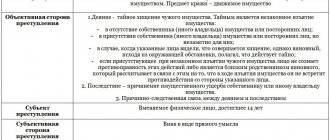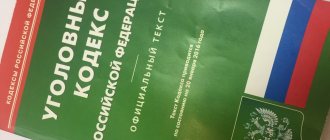Article 109 of the Code of Criminal Procedure of the Russian Federation establishes a clear prescription for the use of one of the procedural measures. Imprisonment can be used not only as a punishment, but also as an interim measure. The procedural area has guidelines for the procedure for assigning such a measure and the timing of its election for those involved in the case. Arrest implies restriction of freedom of movement and location for a short time. Custody can be applied to a person with the status of a suspect, as well as an accused. This measure is applied only to those who can flee from justice.
Multi-channel free hotline Legal advice on criminal law. Every day from 9.00 to 21.00
Moscow and region: +7 (495) 662-44-36
St. Petersburg: +7 (812) 449-43-40
Article 109 (terms of detention)
Temporary restriction of freedom of movement acts as a kind of guarantee that the principle of the law enforcement system - the punishability of the act - will be implemented.
The Criminal Procedure Code allows for several options for being in custody, differing in time period:
- Part 1 of the article states that during the investigation, the maximum allowable time for arrest is 2 months. At the same time, Part 2 clarifies that objective reasons preventing the completion of the investigation are a clear reason to extend the action of the measure taken to 6 months. There is also a caveat that six months is not the limit. If a serious or especially serious crime is being investigated, it is possible to extend the imposed restriction on a person for a longer time.
- Part 3 clarifies that there are exceptions to the established rules. They relate to the disclosure of particularly serious acts. Here the judge can impose a measure of arrest for up to 12 months. To obtain such a decision, a number of special factors must be present in the circumstances of the investigation.
- Part 4 prescribes that in other categories of cases it will be impossible to extend the period of a person’s stay in custody.
Detention in custody according to the Code of Criminal Procedure of the Russian Federation is carried out according to a clear procedure, as well as release and extension.
The Code prohibits extending the duration of this measure beyond 12 months in total (except in exceptional cases). The accused must be released if the legally permitted period of arrest has expired.
The judge's decision on this type of petition may be:
- about extension ─ in the absence of violations and there are grounds;
- about refusal of the application.
The total amount of time a suspect will be arrested will be determined by two dates: the day the arrest decision was made and the day the conviction was issued.
Changes are allowed in the final date, since the investigation of a case does not always end with the accusation of the person who was originally suspected. Here, the end of the prison term may be determined by the date the charges are dropped or the person is released. Accordingly, the period from the date of arrest until the completion of the investigation cannot exceed the period of detention established by law.
The legal provision makes it clear that in special cases the period runs continuously.
We are talking about situations:
- The person was temporarily detained and a little later a preventive measure was prescribed - being under arrest. The first days of arrest will be counted towards the total period of detention.
- Initially, a mild measure was assigned, and then it was changed to imprisonment. The period of a mild measure in the form of arrest at home will be included during the term in the temporary detention facility (temporary detention center).
- The suspect was sent for treatment to a psychiatric institution from the KPZ (pre-trial detention cell) or temporary detention facility. By analogy with previous cases, the time spent on compulsory treatment will be included in the overall calculation of the period of detention.
- A similar rule is used for initial detention on the territory of a foreign state, carried out as the provision of international assistance and execution of agreements. An arrest by law enforcement agencies of a foreign state can be made at the request of the Russian Federation. The time in custody and for transporting the prisoner will be counted towards the total period of pre-trial detention.
The legislator establishes clear actions for calculating the time of detention, including repeated arrests. Such arrests may be made at different times as part of one or more overlapping criminal cases.
The time period here will be perceived as the general course of the period with a break when the person was released from custody.
Here the general course of the period is established. When deciding whether to re-arrest, the judge will be required to take into account the initial time spent by the accused in custody. This provision affects arrests and detentions carried out in the framework of one or more related criminal cases. If an individual is involved in different criminal cases, then the period of arrest for them will be considered separately.
Art. 109 of the Code of Criminal Procedure of the Russian Federation regulates the specifics of consideration of this issue. It is prohibited to consider this issue in court, at which the suspect or accused himself is not present. The only exception is when the main person for whom the measure of restriction is chosen is being treated in a psychiatric institution and, according to specialist forecasts, will remain there for a long time. If a person involved in the case is put on the wanted list, the issue of his detention will be resolved when he is found and brought to court.
The choice of a preventive measure and the establishment of its period of validity is permitted only by the court.
The petition must include not only a request, but also an indication of the specific type of suppression, as well as a clear time period. The judge examines the validity and justification of such a requirement, and then announces his decision.
How is house arrest elected?
House arrest is ordered only by the court based on the results of consideration of the petition of the investigator or interrogator investigating the crime.
Moreover, the issue of its application can be considered at any stage of criminal proceedings, that is, both during the investigation and during the consideration of a criminal case by the court.
Conditions of use
In order for house arrest to be applied, under Art. 97 of the Code of Criminal Procedure of the Russian Federation it is necessary:
- A criminal case where a person has the status of a suspect or accused.
- Availability of data giving grounds to conclude that the accused or suspect:
- will influence witnesses and eyewitnesses, may get rid of evidence or in some other way interfere with the proceedings;
- will continue to commit crimes;
- may hide.
In addition to those indicated, it is mandatory under Art. 99 of the Code of Criminal Procedure of the Russian Federation, other circumstances are taken into account:
- The severity of the crime committed.
- Information about the identity, age of the suspect/accused.
- His state of health, whether he has a family, what he does.
- Other circumstances, for example, behavior, attitude towards the crime, etc.
Court statement
Based on the results of consideration of the petition for house arrest, the court makes a decision. It must describe the conditions of execution, among them:
- residential premises in which the suspect/accused will stay;
- length of stay in custody;
- options for how to contact the investigator, interrogating officer and investigator;
- prohibitions imposed on the arrested person.
Legal commentary on Article 109 of the Code of Criminal Procedure of the Russian Federation
Art.
109 of the Code of Criminal Procedure of the Russian Federation with legal comments ─ these are clarifications on the main provisions of the norm. The most used and frequently used period is 2 months. If this period is not enough to issue an indictment, you can file a petition to increase the originally assigned period to 6 months. The total time of detention cannot exceed six months. Exceptional cases of restriction of freedom are allowed for up to 1 year. They affect the area of especially serious crimes. After all, the punishment for this category of acts is the harshest: the death penalty or life imprisonment. The legislative norm has its own limits of what is permissible. In complex investigations, the maximum time a suspect can stay in custody is 18 months. This is the limit allowed by the legislator. If it is not possible to prove the guilt of the person in custody, all suspicions are removed, and the investigation will have to look for another criminal. The crime being investigated must be particularly complex. There must be good reason to believe that the person involved will definitely try to escape.
Petitions of this type must be drawn up and signed on behalf of the head of the regional prosecutor's office.
The legislation allows only district courts or similar military departments to consider requests for a preventive measure.
Leading legal consultants say that extending the time spent under arrest by more than 18 months is impossible and should not be allowed by investigative authorities. Even if a person spends one day beyond the legal period in a temporary detention facility, the lawyer already has the right to demand his urgent release and write a complaint.
Comments to the article clarify that the current Code of Criminal Procedure establishes periods of detention of suspects and accused persons exclusively for the investigation stage. The procedure for arrest during a trial does not apply to this legal norm, because we are talking about different procedural stages.
The timing of the use of restrictive measures at the stages of inquiry and legal proceedings is regulated by other legal norms. It is noteworthy that the period of consideration of a completed case does not have a time frame for detention.
When ordering the suppression of a criminal's hiding, a time setting is used - days and months. The passage of time will begin from the day the person was actually taken into custody.
The entire list of grounds for granting a request is set out in Article 97:
- the emergence of new circumstances, due to which the documents were sent for further investigation;
- return of the case from the court with a requirement to eliminate deficiencies or obstacles;
- the lawyer and the defendant did not have enough time to study the collected materials on the case.
The commentary to the article notes that the immediate release of a person after the expiration of the established period is a mandatory requirement of the criminal process.
Cancellation and modification of house arrest
General rules for canceling or changing the chosen preventive measure are prescribed in Art. 110 Code of Criminal Procedure of the Russian Federation. The main ones are:
- cancellation if there is no further need;
- change to a more strict or more lenient one - under the circumstances described in the above-mentioned Articles 97, 99 of the Code of Criminal Procedure of the Russian Federation.
House arrest is canceled on the basis of the relevant decision of the investigator, inquiry officer or court, which is handling the criminal case.
A more severe preventive measure in relation to house arrest is only detention.
A change to this measure can also occur exclusively by court order at the request of the investigator or inquiry officer (during the investigation) or the Criminal Investigation Department (during the judicial review). Such a decision may be made in the following circumstances:
- Failure to comply with the conditions of house arrest.
- Disagreement with the use of technology. means of control.
- Intentional damage, destruction, or violation of integrity.
- Performing actions that lead to disruption of the normal operation of equipment.
Examples of practice: court decisions and sentences under Article 109 of the Code of Criminal Procedure of the Russian Federation
The court does not limit the time a person can be held in custody.
He will remain there until the end of the trial. However, the Constitutional Court of the Russian Federation in its clarifications indicated a requirement for Russian courts: every 3 months to consider the issue of the objectivity of the current measure before passing a verdict. The length of stay of citizens of the Russian Federation in custody during criminal proceedings, at all stages of the process, has a strictly established period. But the Constitutional Court of the Russian Federation in its Determinations dated June 6, 2003 N 184-O, dated July 15, 2003 N 308-O, dated April 23, 2013 N 548-O and dated April 22, 2014, drew attention to the fact that there is a law without clear terms of permissible detention, and its application cannot be regarded as a constitutional violation of the rights of a citizen.
Naturally, law enforcement, investigative and judicial authorities are required to know the current legal provisions on periods of detention. When considering complex cases, the court may take advantage of exceptions to this rule and make a strict decision on restriction of freedom. However, infringement of human rights, even if he is a suspect or accused, is not allowed.
Based on the current practice of making decisions on preventive measures, the following conclusions can be drawn:
- For categories of light severity of acts, detention is not assigned.
- Strict measures are applied in 100% of cases for serious and especially serious crimes.
- For an average offense, the choice of this type of measure is 50% to 50%, depending on the identity of the suspect and other circumstances of the case.
- When considering the issue of a preventive measure, the court is obliged to take into account the objectivity and necessity of such a decision in each individual case.
The listed factors indicate that not in all situations such a measure of detaining a suspect is used.
Now the court has begun to actively use house arrest as a guarantee that the person will remain under investigation until the end of the trial. Just remember that in order to call a person, the investigative authorities send a notice in advance.
If a person fails to appear at least once in response to such a notification, the investigator has every right to raise the issue of changing the assigned measure to a more stringent one - detention.
What is house arrest
House arrest is a coercive measure in criminal proceedings designed to prevent possible interference in finding out the truth in a criminal case. This is one of the most severe preventive measures. Her choice is due to the impossibility of using a more humane measure, for example, bail or recognizance not to leave.
House arrest is isolation from society of the suspect/accused in a home where he remains permanently on any legal basis (in his own, rented home, etc.).
Provided that he needs hospital treatment, he can be isolated in a medical facility. The arrested person is also subject to a number of prohibitions.









